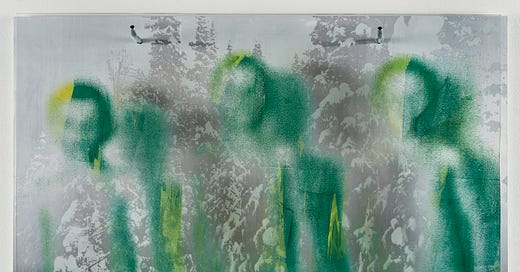HOW ECHOES OF OTHER BOOKS BECOME CHANNELS INTO YOUR OWN
and then there are writers who thrive in the company of other voices, who reject the notion that more learning — more story — could ever make the task of writing harder.
Two related question from our office hours! Echoes about Echoes!
Q: Do you read other fiction when drafting? If so are they similar in voice, genre or topic as part of research or do you read completely different works so as not to be influenced?
Q: My writing seems to morph (into) the book I am reading very passionately over a long period of time … now that you are an experienced writer, does your voice adopt other writers or has gained some traction that you can call your own finally and is not subject to morphing.
When does that happen if it happens? Does it happen due to getting out a lot of superficialness out of you by writing it out.
Thank you for your questions, and here’s my standard warning before I begin: we all interpret the music that is our fiction (and that is fiction in general) differently and dance our own idiosyncratic dance as a result. While there will inevitably be plenty of overlaps and similarities, my writing dance will never perfectly match your writing dance or anyone else’s, and even the best writer’s approach, rhythm, technique, can never be comprehensive or definitive.
Now to the questions.
I have plenty of colleagues who make it a point to not read when they’re writing, precisely out of fear that whatever they read will influence the work — maybe out of a fear that the Influence will compromise their work, making it less theirs or less effective. And then there are writers like me who never stop reading while we write, who thrive in the company of other voices, who reject the notion that more learning — more story — could make the task of writing harder. Same as there are writers who must isolate themselves completely to write, and other writers who will compose entire novels in a crowded café or at a bar. (I actually know someone who wrote two novels at a busy bar, the owners were kind enough to let them work there all day long.) In my MFA days there were writers who shunned “theory” for fear it would fuck up their work, and others of us who practiced no such abstinence and sought “theory” out eagerly. And other writers who, over time (or depending on the project), moved from one side of the spectrum to the other or who were hybrids.
Is either of the main approaches — exclusionary or inclusionary — “superior” — better at producing work?
Again, I’ve made no longitudinal study, but if you want my limited biased non-binding position: I seriously doubt either approach is better or worse for the writing. After all, plenty of my subtractive / exclusionary writer friends write and publish their work just as prolifically and beautifully as my additive / inclusionary friends. Plus, as I mentioned above, not everyone is firmly in either camp and some writers are in both camps simultaneously.
Still, as someone who does read other people’s fiction while I’m writing — who needs the larger fictional current running through me in order to generate my own sparks — I’ve definitely run into situations where something I’m reading begins to chime too loudly in my head. That’s one of the perils of the reader-writer — creativity, after all, calls creativity — and in that liminal underworld of creation one can become open to all manner of visitations and possessions. Which explains why it’s so easy for another person’s writing to resound strongly in oneself. I’ve come to regard these Echoes less as intruders and more as messengers — though as usual with any writing one has to decipher the message before one can use it wisely.
My Echoes (for whatever it’s worth) tend to fall into the following categories:




